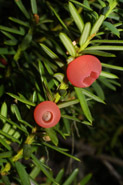
If it weren't for the incredible variety and complexity of the plants in the world, we would not have the pain relieving, life saving drugs available to us today.
Three quarters of the drugs we currently use were originally derived from plants and a quarter still require plant tissue for production. One such drug is taxol, which is isolated from the bark of the Pacific yew tree.
Taxol inhibits mitosis in cells, which keeps cancer cells from multiplying. It's now the drug of choice for some breast cancers, ovarian and lung cancer, as well as those of the head or neck.
The challenge in producing Taxol has been that it's a complicated organic molecule, and chemical synthesis was attempted but proved difficult, and never cost effective. Chemical synthesis is how most drugs are made today.
For example, aspirin originally came from willow bark and is now chemically synthesized. When drugs can't be chemically synthesized, their ability to be produced cheaply can be limited by how much of the plant is available and whether extraction is simple.
If Taxol had to be derived directly from the Yew tree, hundreds of thousands of the trees would need to be harvested yearly, which is not ecological or cheap.
In the 1990's, scientists discovered they could produce more of the drug by culturing the tissue of a related shrub. However, this process still couldn't produce a predictable amount of taxol.
Recently a group of researchers got around this. They were able to isolate undifferentiated cambrial meristematic cells from the shrub. These plant cells are equivalent to human stem cells, and they can be used to cheaply produce a vast amount of taxol.
Even better news is that this new plant stem cell technology may apply to other plant derived products that are expensive or difficult to make.
More Information
ScienceDaily article that describes the culturing of plant cells for the production of the anti-cancer drug Taxol: Plant Stem Cells Could Be Fruitful Source of Low Cost Cancer Drug
Original journal article that describes the culturing of plant cells in the laboratory for the production of natural products with biological activity. Eun-Kyong Lee, Young-Woo Jin, Joong Hyun Park, et al. Nature Biotechnology, 2010; DOI: Cultured cambial meristematic cells as a source of plant natural products
The story of the discovery and development of one of the most anticipated new cancer drugs of our generation. Nicely written by Frank Stephenson, with photographs: A Tale of Taxol